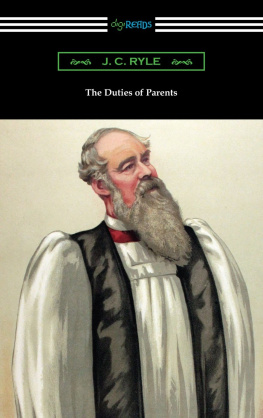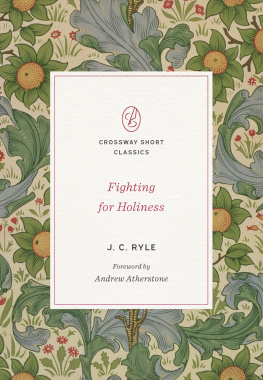J. C. Ryle - The Duties of Parents
Here you can read online J. C. Ryle - The Duties of Parents full text of the book (entire story) in english for free. Download pdf and epub, get meaning, cover and reviews about this ebook. year: 2020, publisher: Neeland Media LLC, genre: Religion. Description of the work, (preface) as well as reviews are available. Best literature library LitArk.com created for fans of good reading and offers a wide selection of genres:
Romance novel
Science fiction
Adventure
Detective
Science
History
Home and family
Prose
Art
Politics
Computer
Non-fiction
Religion
Business
Children
Humor
Choose a favorite category and find really read worthwhile books. Enjoy immersion in the world of imagination, feel the emotions of the characters or learn something new for yourself, make an fascinating discovery.
The Duties of Parents: summary, description and annotation
We offer to read an annotation, description, summary or preface (depends on what the author of the book "The Duties of Parents" wrote himself). If you haven't found the necessary information about the book — write in the comments, we will try to find it.
The Duties of Parents — read online for free the complete book (whole text) full work
Below is the text of the book, divided by pages. System saving the place of the last page read, allows you to conveniently read the book "The Duties of Parents" online for free, without having to search again every time where you left off. Put a bookmark, and you can go to the page where you finished reading at any time.
Font size:
Interval:
Bookmark:

THE DUTIES OF PARENTS
By J. C. RYLE
The Duties of Parents
By J. C. Ryle
Print ISBN 13: 978-1-4209-7192-7
eBook ISBN 13: 978-1-4209-7193-4
This edition copyright 2020. Digireads.com Publishing.
All rights reserved. No part of this publication may be reproduced, distributed, or transmitted in any form or by any means, including photocopying, recording, or other electronic or mechanical methods, without the prior written permission of the publisher, except in the case of brief quotations embodied in critical reviews and certain other noncommercial uses permitted by copyright law.
Cover Image: a detail of Caricature of John Charles Ryle, by Carlo Pellegrini, published in Vanity Fair, March 26, 1881.
Please visit www.digireads.com
CONTENTS
THE DUTIES OF PARENTS
TRAIN UP A CHILD IN THE WAY HE SHOULD GO:
A S ERMON FOR P ARENTS
P REACHED IN H ELMINGHAM C HUCH .
A UGUST 20, 1845.
B Y THE R EV . J OHN C HARLES R YLE
The substance of this Sermon was preached at a Weekly Lecture in Helmingham Church. It is now published at the request of some who heard it. In preparing it for publication some things have been added, which I had not time to dwell upon in the pulpit. I would ask the indulgence of those who will still think I have omitted points of great importance, and I would beg them to remember, that in so vast a subject as the Training of Children, it is next to impossible to touch upon everything, or to meet the wishes of all. If God shall make it a word in season to any one parents heart, I shall be thankful and content.
J. C. RYLE.
H ELMINGHAM , M ARCH 22 ND , 1846.
Train up a child in the way he should go; and when he is old, he will not depart from it.Prov. 22:6.
I suppose that most professing Christians are acquainted with the text at the head of this page. The sound of it is probably familiar to your ears, like an old tune. It is likely you have heard it, or read it, talked of it, or quoted it, many a time. Is it not so?
But, after all, how little is the substance of this text regarded! The doctrine it contains appears scarcely known, the duty it puts before us seems fearfully seldom practised. Reader, do I not speak the truth?
It cannot be said that the subject is a new one. The world is old, and we have the experience of nearly six thousand years to help us. We live in days when there is a mighty zeal for education in every quarter. We hear of new schools rising on all sides. We are told of new systems, and new books for the young, of every sort and description. And still for all this, the vast majority of children are manifestly not trained in the way they should go, for when they grow up to mans estate, they do not walk with God.
Now how shall we account for this state of things? The plain truth is, the Lords commandment in our text is not regarded; and therefore the Lords promise in our text is not fulfilled.
Reader, these things may well give rise to great searchings of heart. Suffer then a word of exhortation from a minister, about the right training of children. Believe me, the subject is one that should come home to every conscience, and make every one ask himself the question, Am I in this matter doing what I can?
It is a subject that concerns almost all. There is hardly a household that it does not touch. Parents, nurses, teachers, godfathers, godmothers, uncles, aunts, brothers, sisters,all have an interest in it. Few can be found, I think, who might not influence some parent in the management of his family, or affect the training of some child by suggestion or advice. All of us, I suspect, can do something here, either directly or indirectly, and I wish to stir up all to bear this in remembrance.
It is a subject, too, on which all concerned are in great danger of coming short of their duty. This is pre-eminently a point in which men can see the faults of their neighbours more clearly than their own. They will often bring up their children in the very path which they have denounced to their friends as unsafe. They will see motes in other mens families, and overlook beams in their own. They will be quick sighted as eagles in detecting mistakes abroad, and yet blind as bats to fatal errors which are daily going on at home. They will be wise about their brothers house, but foolish about their own flesh and blood. Here, if anywhere, we have need to suspect our own judgment. This, too, you will do well to bear in mind.
Come now, and let me place before you a few hints about right training. God the Father, God the Son, God the Holy Ghost bless them, and make them words in season to you all Reject them not because they are blunt and simple; despise them not because they contain nothing new. Be very sure, if you would train children for heaven, they are hints that ought not to be lightly set aside.
I. First, then, if you would train your children rightly, train them in the way they should go, and not in the way that they would .
Remember children are born with a decided bias towards evil, and therefore if you let them choose for themselves, they are certain to choose wrong.
The mother cannot tell what her tender infant may grow up to be,tall or short, weak or strong, wise or foolish: he may be any of these things or not,it is all uncertain. But one thing the mother can say with certainty: he will have a corrupt and sinful heart. It is natural to us to do wrong. Foolishness, says Solomon, is bound in the heart of a child. (Prov. xxii. 15.) A child left to himself bringeth his mother to shame. (Prov. xxix. 15.) Our hearts are like the earth on which we tread; let it alone, and it is sure to bear weeds.
If, then, you would deal wisely with your child, you must not leave him to the guidance of his own will. Think for him, judge for him, act for him, just as you would for one weak and blind; but for pitys sake, give him not up to his own wayward tastes and inclinations. It must not be his likings and wishes that are consulted. He knows not yet what is good for his mind and soul, any more than what is good for his body. You do not let him decide what he shall eat, and what he shall drink, and how he shall be clothed. Be consistent, and deal with his mind in like manner. Train him in the way that is scriptural and right, and not in the way that he fancies.
If you cannot make up your mind to this first principle of Christian training, it is useless for you to read any further. Self-will is almost the first thing that appears in a childs mind; and it must be your first step to resist it.
II. Train up your child with all tenderness, affection, and patience .
I do not mean that you are to spoil him, but I do mean that you should let him see that you love him.
Love should be the silver thread that runs through all your conduct. Kindness, gentleness, long-suffering, forbearance, patience, sympathy, a willingness to enter into childish troubles, a readiness to take part in childish joys,these are the cords by which a child may be led most easily,these are the clues you must follow if you would find the way to his heart.
Few are to be found, even among grown-up people, who are not more easy to draw than to drive. There is that in all our minds which rises in arms against compulsion; we set up our backs and stiffen our necks at the very idea of a forced obedience. We are like young horses in the hand of a breaker:handle them kindly, and make much of them, and by and by you may guide them with thread; use them roughly and violently, and it will be many a month before you get the mastery of them at all.
Now childrens minds are cast in much the same mould as our own. Sternness and severity of manner chill them and throw them back. It shuts up their hearts, and you will weary yourself to find the door. But let them only see that you have an affectionate feeling towards them,that you are really desirous to make them happy, and do them good,that if you punish them, it is intended for their profit, and that, like the pelican, you would give your hearts blood to nourish their souls; let them see this, I say, and they will soon be all your own. But they must be wooed with kindness, if their attention is ever to be won.
Next pageFont size:
Interval:
Bookmark:
Similar books «The Duties of Parents»
Look at similar books to The Duties of Parents. We have selected literature similar in name and meaning in the hope of providing readers with more options to find new, interesting, not yet read works.
Discussion, reviews of the book The Duties of Parents and just readers' own opinions. Leave your comments, write what you think about the work, its meaning or the main characters. Specify what exactly you liked and what you didn't like, and why you think so.



![J. C. Ryle - The Cross [Annotated, Updated]: Crucified with Christ, and Christ Alive in Me](/uploads/posts/book/150302/thumbs/j-c-ryle-the-cross-annotated-updated.jpg)







